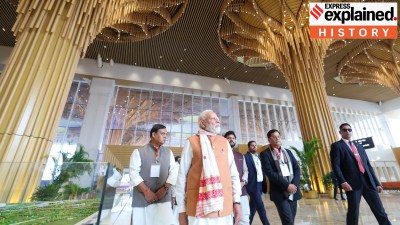Democracy doesn146;t keep faith with reservations
The Andhra Pradesh government8217;s announcement of a five percent job reservation for Muslims is treading down a dangerous legal and polit...

The Andhra Pradesh government8217;s announcement of a five percent job reservation for Muslims is treading down a dangerous legal and political path. The full integration of Muslims into India8217;s public life, and the expansion of opportunities for them ought to be the endeavour of public policy. But reservations of the kind just announced are not an effective means of achieving the desired objective. It could be potentially counter productive.
Anyone concerned with the future of Indian democracy ought to concede that the alienation of Muslims from India8217;s public institutions and their economic marginalisation should be matters of grave concern. Targeting Muslims for simply being who they are has become commonly legitimised. The state on many occasions has openly condoned discriminatory treatment towards them in matters of securing justice.
The space for an autonomous Muslim politics has been almost non-existent, caught between political parties that ominously target them, and political parties that cynically use them. And Muslim politics has not been well served by its leaders, who have been reluctant to democratise institutions relevant to Muslims. All of these forces have combined to ensure that Muslims, rather than being integrated as equal citizens, unencumbered by the weight of their identities, are constantly put in the position of being a supplicant minority. Millions of ordinary Muslims have paid the price for this myopia.
This context has to serve as a background for any discussion of the issue of Muslim reservations. The majority has to recognise that integrating Muslims and expanding opportunities for them is an important political task. It would be height of folly to ignore it. On the other hand, we ought to be careful not to enact policies that are either empty political gestures, or have the potential for producing harm.
The case for reservations for Muslims is however weak on many grounds. They are economically more marginalised and under-represented in public services. But the most effective solution to this is not reservations. It is their inclusion in all schemes that are aimed at expanding opportunities for citizens: education and so forth. On this front the state needs to give a credible commitment.
There is a real opportunity cost to a public discourse obsessed by reservation. We have become attuned to thinking of the well being of marginalised communities only on one dimension. But we know that is downright false to claim that reservations are genuine anti-poverty programmes. Reservations is not an act of commitment by the state to the cause of Muslims, it is a cover up for its failures to address their needs. Second, it is often argued that Muslims were being discriminated against under current reservation provisions. Muslims from oppressed castes, whose status did not really alter on account of being Muslim, were being arbitrarily denied the benefits of reservation. Was this not a form of religious discrimination?
This argument is also disingenuous in two respects. First, it is a reductio ad absurdum of our reservations policy, not an argument in its favour. The same argument could be applied on behalf of poor Brahmins or Rajputs. Are they not being excluded simply on account of their caste? Second, the Mandal commission had made provisions for some reservations for backward Muslim castes. Various states have been directed to implement these provisions. What it had objected to was declaring Muslims as a whole a backward community, enjoying the same status as Scheduled Castes or Tribes.
What is insidious about the Andhra legislation is that is going down the path of reifying a single Muslim interest, irrespective of caste, class and regional differences. Many prominent Muslims have been arguing, with considerable merit, that an understanding of Muslim society should involve an acknowledgment of its complex and various sociology and history. Classifying the Muslims qua community as backward is another step in abridging this complexity. It is giving succour to those who deploy 8220;Muslim8221; as a reified category to target them. Finally, great poverty and economic deprivation amongst the Muslims needs to be addressed. But the rationale for reservations for Scheduled Castes and Scheduled tribes was entirely different. It was based on a particular experience of oppression and discrimination. It would make a mockery of our history, if we put the two forms of marginalisation in roughly the same category, and suggested the same remedies for both.
What the Muslims need most of all is defeating the ideologies of hate that have made them more vulnerable over the last decade or so. Hindutva was, in part, made possible by Congress8217; footloose interpretation of secularism. On this view secularism meant generating a political dynamic whereby religious groups would jostle with state for benefits qua religious communities.
This was a secularism of political expediency, not a secularism of principle. It created an ugly politics, where different religious groups would measure their standing by how many concessions they had mange to wrest from the state qua religious groups. Rather than making religious identities irrelevant for politics and public policies, it opened up space for them even more insistently. Anybody familiar with our recent history ought to understand that this reification of religious identities and their intrusion into public policy is a recipe for disaster. It is wishful thinking to suppose that enacting reservations for Muslims qua Muslims, will not unleash a politics of that kind again. We will all start measuring what a government does, not by the general provisions it makes for the common good, but by the benefits it targets towards particular communities. Anyone familiar with recent Indian history ought to be disturbed by this scenario, for its biggest beneficiaries are going to be the votaries of Hindutva.
It could be argued that the fear of Hindutva cannot be allowed to hold desirable policies to ransom. There is some truth to this, but risking a politics of religious competition of the kind Congress subject us to for two decades, better have a compelling moral and political justification. Reservations for Muslims have no such justification. It will not help them economically. It might marginally increase their representation in the state, but unleash a process that alienates them from politics further. It is against the rather wise consensus of our founding fathers that the history of Muslims and Dalits cannot be equated. And it is against norms of fairness, for it will only underscore the deprivation of those who are poor but don8217;t fall under any category of reservations. The Congress is once again playing politics on a delicate matter and will put in jeopardy the interests of those it is pretending to help.
The author is Visiting Professor of Government at Harvard University
- 01
- 02
- 03
- 04
- 05































